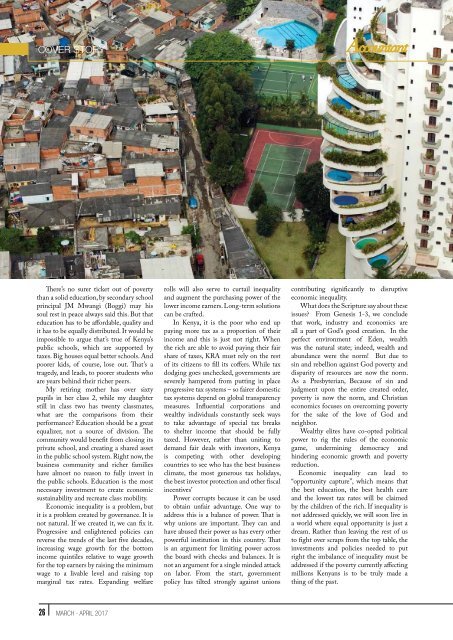The Accountant-Mar-April 2017
Create successful ePaper yourself
Turn your PDF publications into a flip-book with our unique Google optimized e-Paper software.
COVER STORY<br />
<strong>The</strong>re’s no surer ticket out of poverty<br />
than a solid education, by secondary school<br />
principal JM Mwangi (Boggi) may his<br />
soul rest in peace always said this. But that<br />
education has to be affordable, quality and<br />
it has to be equally distributed. It would be<br />
impossible to argue that’s true of Kenya’s<br />
public schools, which are supported by<br />
taxes. Big houses equal better schools. And<br />
poorer kids, of course, lose out. That’s a<br />
tragedy, and leads, to poorer students who<br />
are years behind their richer peers.<br />
My retiring mother has over sixty<br />
pupils in her class 2, while my daughter<br />
still in class two has twenty classmates,<br />
what are the comparisons from their<br />
performance? Education should be a great<br />
equalizer, not a source of division. <strong>The</strong><br />
community would benefit from closing its<br />
private school, and creating a shared asset<br />
in the public school system. Right now, the<br />
business community and richer families<br />
have almost no reason to fully invest in<br />
the public schools. Education is the most<br />
necessary investment to create economic<br />
sustainability and recreate class mobility.<br />
Economic inequality is a problem, but<br />
it is a problem created by governance. It is<br />
not natural. If we created it, we can fix it.<br />
Progressive and enlightened policies can<br />
reverse the trends of the last five decades,<br />
increasing wage growth for the bottom<br />
income quintiles relative to wage growth<br />
for the top earners by raising the minimum<br />
wage to a livable level and raising top<br />
marginal tax rates. Expanding welfare<br />
rolls will also serve to curtail inequality<br />
and augment the purchasing power of the<br />
lower income earners. Long-term solutions<br />
can be crafted.<br />
In Kenya, it is the poor who end up<br />
paying more tax as a proportion of their<br />
income and this is just not right. When<br />
the rich are able to avoid paying their fair<br />
share of taxes, KRA must rely on the rest<br />
of its citizens to fill its coffers. While tax<br />
dodging goes unchecked, governments are<br />
severely hampered from putting in place<br />
progressive tax systems – so fairer domestic<br />
tax systems depend on global transparency<br />
measures. Influential corporations and<br />
wealthy individuals constantly seek ways<br />
to take advantage of special tax breaks<br />
to shelter income that should be fully<br />
taxed. However, rather than uniting to<br />
demand fair deals with investors, Kenya<br />
is competing with other developing<br />
countries to see who has the best business<br />
climate, the most generous tax holidays,<br />
the best investor protection and other fiscal<br />
incentives’<br />
Power corrupts because it can be used<br />
to obtain unfair advantage. One way to<br />
address this is a balance of power. That is<br />
why unions are important. <strong>The</strong>y can and<br />
have abused their power as has every other<br />
powerful institution in this country. That<br />
is an argument for limiting power across<br />
the board with checks and balances. It is<br />
not an argument for a single minded attack<br />
on labor. From the start, government<br />
policy has tilted strongly against unions<br />
contributing significantly to disruptive<br />
economic inequality.<br />
What does the Scripture say about these<br />
issues? From Genesis 1-3, we conclude<br />
that work, industry and economics are<br />
all a part of God’s good creation. In the<br />
perfect environment of Eden, wealth<br />
was the natural state; indeed, wealth and<br />
abundance were the norm! But due to<br />
sin and rebellion against God poverty and<br />
disparity of resources are now the norm.<br />
As a Presbyterian, Because of sin and<br />
judgment upon the entire created order,<br />
poverty is now the norm, and Christian<br />
economics focuses on overcoming poverty<br />
for the sake of the love of God and<br />
neighbor.<br />
Wealthy elites have co-opted political<br />
power to rig the rules of the economic<br />
game, undermining democracy and<br />
hindering economic growth and poverty<br />
reduction.<br />
Economic inequality can lead to<br />
“opportunity capture”, which means that<br />
the best education, the best health care<br />
and the lowest tax rates will be claimed<br />
by the children of the rich. If inequality is<br />
not addressed quickly, we will soon live in<br />
a world where equal opportunity is just a<br />
dream. Rather than leaving the rest of us<br />
to fight over scraps from the top table, the<br />
investments and policies needed to put<br />
right the imbalance of inequality must be<br />
addressed if the poverty currently affecting<br />
millions Kenyans is to be truly made a<br />
thing of the past.<br />
26 MARCH - ApRIL <strong>2017</strong>

















